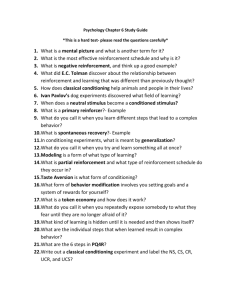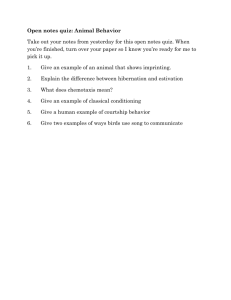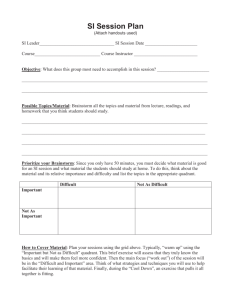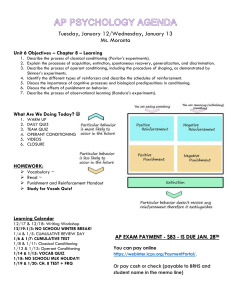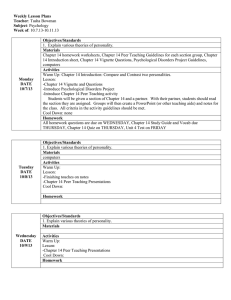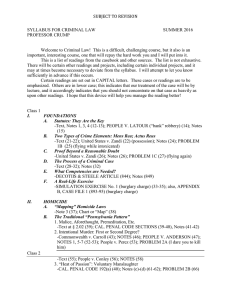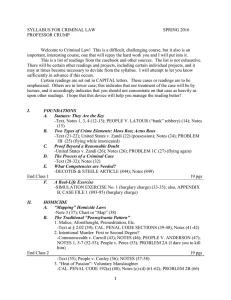Weekly Lesson Plans Teacher: Tasha Bowman Subject: Psychology
advertisement
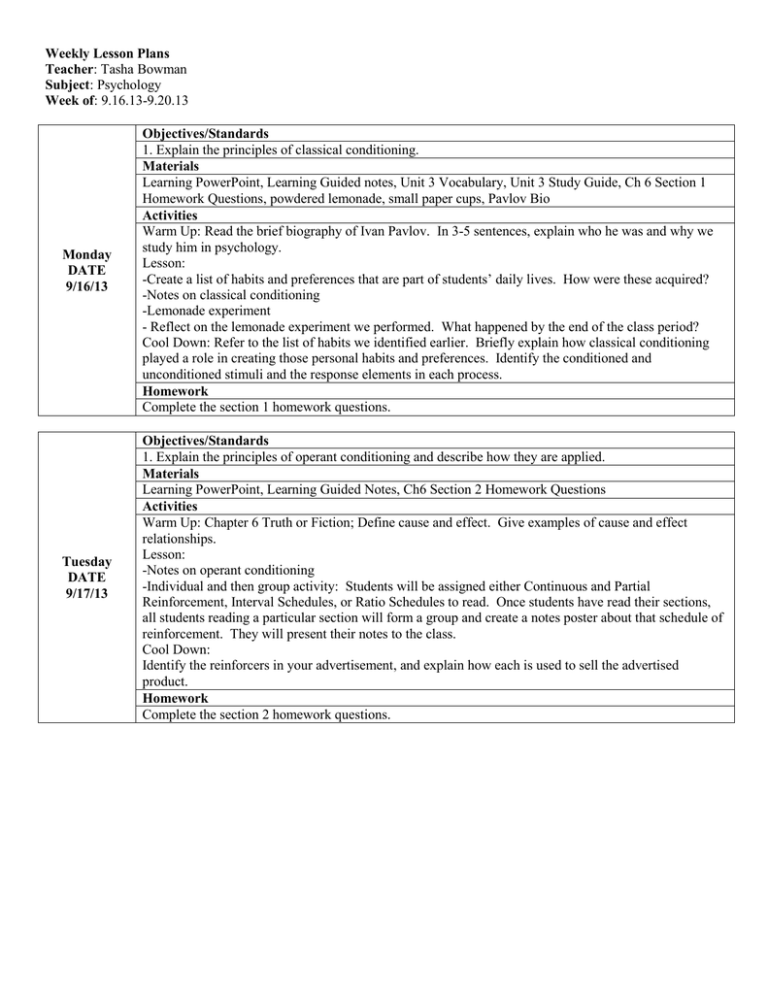
Weekly Lesson Plans Teacher: Tasha Bowman Subject: Psychology Week of: 9.16.13-9.20.13 Monday DATE 9/16/13 Objectives/Standards 1. Explain the principles of classical conditioning. Materials Learning PowerPoint, Learning Guided notes, Unit 3 Vocabulary, Unit 3 Study Guide, Ch 6 Section 1 Homework Questions, powdered lemonade, small paper cups, Pavlov Bio Activities Warm Up: Read the brief biography of Ivan Pavlov. In 3-5 sentences, explain who he was and why we study him in psychology. Lesson: -Create a list of habits and preferences that are part of students’ daily lives. How were these acquired? -Notes on classical conditioning -Lemonade experiment - Reflect on the lemonade experiment we performed. What happened by the end of the class period? Cool Down: Refer to the list of habits we identified earlier. Briefly explain how classical conditioning played a role in creating those personal habits and preferences. Identify the conditioned and unconditioned stimuli and the response elements in each process. Homework Complete the section 1 homework questions. Tuesday DATE 9/17/13 Objectives/Standards 1. Explain the principles of operant conditioning and describe how they are applied. Materials Learning PowerPoint, Learning Guided Notes, Ch6 Section 2 Homework Questions Activities Warm Up: Chapter 6 Truth or Fiction; Define cause and effect. Give examples of cause and effect relationships. Lesson: -Notes on operant conditioning -Individual and then group activity: Students will be assigned either Continuous and Partial Reinforcement, Interval Schedules, or Ratio Schedules to read. Once students have read their sections, all students reading a particular section will form a group and create a notes poster about that schedule of reinforcement. They will present their notes to the class. Cool Down: Identify the reinforcers in your advertisement, and explain how each is used to sell the advertised product. Homework Complete the section 2 homework questions. Wednesday DATE 9/18/13 Objectives/Standards 1. Discuss the cognitive factors in learning. Materials Bandura Bio, Learning PowerPoint, Learning Guided Notes, Ch 6 Section 3 Homework Questions Activities Warm Up: Read the brief biography of Albert Bandura. In 3-5 sentences, describe who he is and why we study him in psychology. Lesson: -How do you know where objects are in your home, school, and neighborhood? How many things have you learned from observing other people, reading books, or watching television? Create a map of the high school. How are our maps similar? Different? -Notes on cognitive factors in learning. Cool Down: What might you learn from observing various media? What are some pros and cons in the access young people have to the media? Homework Complete the section 3 homework questions. Thursday DATE 9/19/13 Objectives/Standards 1. Identify the steps of the PQ4R method of learning. Materials Ch6 Section 4 Homework Questions. Activities Warm Up: Glance over section 4 in your textbook. Create questions about the section without reading the entire section. Lesson: - Notes on the PQ4R method -“Misunderstood Minds” online activity- assign students a different section and have students complete the activity for that section and answer the questions associated with it. Cool Down: Reflect on the online activity. Was the activity easy? Difficult? How does this modify your view of learning disabilities? Homework Complete the section 4 homework questions. Chapter 6 vocab and study guide due tomorrow. Friday DATE 9/20/13 Objectives/Standards 1. Review for quiz. 2. Demonstrate learning with a chapter quiz. Materials Education Portal Videos, Education Portal Video Questions, Chapter 6 Quiz Activities Warm Up: Choose a specific behavior and develop a hypothesis about the types and schedules of reinforcement that would work best to modify that behavior. Lesson: -Education Portal videos and questions -Chapter 6 Quiz Cool Down: Homework Work on Unit 3 vocabulary and study guide. (Chapter 7 due Wednesday)

